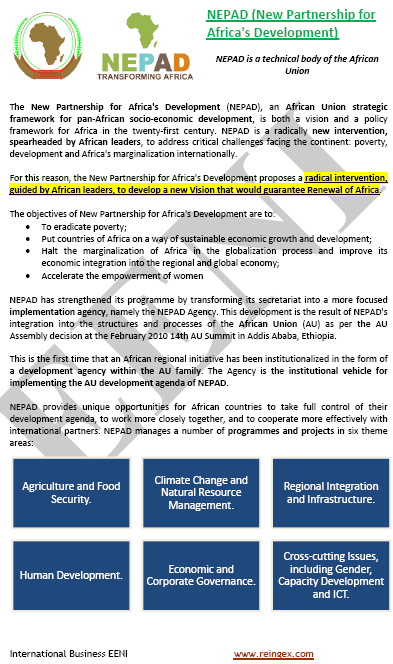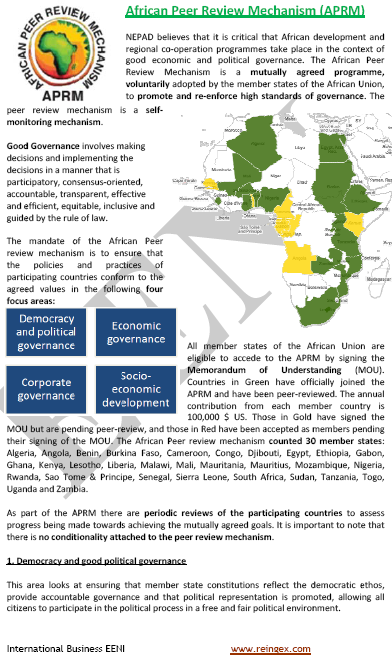African Union Development Agency (AUDA-NEPAD)
Socio-economic development framework. African Union Development Agency (AUDA-NEPAD)

The African Union Development Agency (AUDA-NEPAD)is intended to address actual defiance facing African Countries. Topics managed by AUDA-NEPAD are incrementing poverty levels, underdevelopment, or African marginalization.
For this reason, AUDA-NEPAD proposes a radical intervention, guided by the African leaders, to develop a new vision that would guarantee African Renewal.


- Introduction to AUDA-NEPAD
- Former name: New Partnership for Africa's Development NEPAD
- Governance Structures of AUDA-NEPAD
- AUDA-NEPAD Secretariat
- AUDA-NEPAD Planning and Coordinating Agency
- Strategic Plan
- Thematic Areas of AUDA-AUDA-NEPAD
- Agriculture and Food Security
- Regional Integration and Infrastructure
- African Union/AUDA-NEPAD African Action Plan
- Transport and Energy related programs
- Intra-African trade
- Other areas: gender, information and communication technologies, private sector, finance
- Capacity Development Initiative
- Economic and Corporate Governance (AUDA-NEPAD)
- African Peer Review Mechanism
- Democracy and political governance
- Economic governance
- Corporate governance
- Socio-economic development
- AUDA-NEPAD and the African Regional Economic Communities
Sample - African Union Development Agency (AUDA-NEPAD):

The educational aims of the Subject “African Union Development Agency (AUDA-NEPAD)” are to:
- Understand the purposes and the thematic areas of AUDA-NEPAD of the African Union
- Know AUDA-NEPAD strategic plan
- Explore AUDA-NEPAD programs
- Analyze the role of AUDA-NEPAD in relation to trade between African Countries, African Value Chains, transport in Africa, and African integration
- Know the four pillars of the Comprehensive Africa Agriculture Development Programme (CAADP)
- Understand the African Peer Review Mechanism (APRM)
- Understand the relationship between Regional Economic Communities and AUDA-NEPAD

The Subject “African Union Development Agency (AUDA-NEPAD)” is included within the curriculum of the following academic programs at EENI Global Business School:
Doctorate in African Business.

Master in Business in Africa, Transport and Logistics in Africa.

Languages:  or
or  Nouveau partenariat pour le développement de l’Afrique (AUDA-NEPAD)
Nouveau partenariat pour le développement de l’Afrique (AUDA-NEPAD)  NEPAD Nova Parceria Desenvolvimento Africa
NEPAD Nova Parceria Desenvolvimento Africa  Nueva Alianza Desarrollo de África.
Nueva Alianza Desarrollo de África.
Credits of the Subject “African Union Development Agency (AUDA-NEPAD)”: 1 
African Union Development Agency (AUDA-NEPAD).
The objectives of AUDA-NEPAD are to:
- Eradicate poverty
- Put the African Countries on a way of sustainable economic growth and development
- Halt the African marginalization in the Globalization process and improve its economic integration into the regional and Global Economy
- Accelerate the African women empowerment
The principles of AUDA-NEPAD are:
- Good governance as a basic requisite for peace, security, and sustainable development
- Ownership and Leadership of Africa, deep participation by all the segments of African Society
- Attaching the Africa's Development on its resources and the African people
- Regional Partnership between African people
- Acceleration of regional and African Integration
- Develop competitiveness of the African economies
- Creating a new international partnership that changes the unequal relationship between Africa and developed world
- Assuring that all partnerships with AUDA-NEPAD are linked to the Millennium Development Goals

The member countries of African Union Development Agency (AUDA-NEPAD) are Algeria, Angola, Benin, Botswana, Burkina Faso, Burundi, Cameroon, Cape Verde, Central African Republic, Comoros, Chad, Democratic Republic of the Congo, Djibouti, Ivory Coast, Egypt, Eritrea, Eswatini, Ethiopia, Gabon, Gambia, Ghana, Guinea-Bissau, Guinea, Equatorial Guinea, Kenya, Lesotho, Liberia, Libya, Madagascar, Malawi, Mali, Mauritania, Mauritius, Morocco, Mozambique, Namibia, Niger, Nigeria, Uganda, Republic of the Congo, Rwanda, São Tomé and Príncipe, Senegal, Seychelles, Sierra Leone, Somalia, Sudan, Tanzania, Togo, Tunisia, Zambia, Zimbabwe, and Western Sahara.
AUDA-NEPAD belongs to African Civilization.
The African Peer Review Mechanism is a reciprocally agreed instrument voluntarily acceded to by the member economies of the African Union as an African self-monitoring mechanism.
Related topics:
Sample - African Peer review mechanism:

(c) EENI Global Business School (1995-2025)
Top of this page








 WhatsApp
WhatsApp